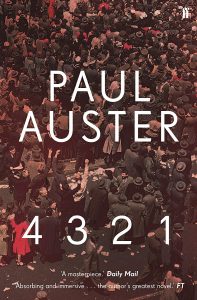Paul Auster, 4 3 2 1 (London: Faber & Faber, 2013) 1070pp. ISBN: 978-0-571-32465-1
 It seems I can only read a big novel when I am on holiday; life seems too busy otherwise. This is certainly the biggest novel I have read in some years, and although I enjoyed it, it is not as absorbing as I hoped it might be. Having said that, however, I should note that it was shortlisted for the Man Booker prize in 2017, has received some very positive reviews, and it is possible that I will read it again one day, albeit differently.
It seems I can only read a big novel when I am on holiday; life seems too busy otherwise. This is certainly the biggest novel I have read in some years, and although I enjoyed it, it is not as absorbing as I hoped it might be. Having said that, however, I should note that it was shortlisted for the Man Booker prize in 2017, has received some very positive reviews, and it is possible that I will read it again one day, albeit differently.
Auster has written a long, sprawling account of one young life—Archie Ferguson’s—who was born on March 3, 1947 and continues through to around his twenty-second year of life. Set primarily in New York, the novel provides a kaleidoscope of images from mid-century American history, especially in the 1960s, and especially to do politics, Vietnam, and inevitably, a young man’s sexual awakening and adventures.
The unique aspect of the novel, foreshadowed in the title, is that it is not a single account of young Archie’s life, but four quite distinct though related accounts, four possible lives marked by different fortunes, turns-of-event, and outcomes. Chapter one provides the pre-history leading up to Archie’s birth before subsequent chapters are each structured in four parts providing the distinct accounts of the life, development, and adventures of each persona in each of the periods in view.
Auster’s portrayals of the “different Archies” is the strength of the book, together with the careful inclusion of historical detail which makes the era live with the vividness of a contemporary newspaper. Archie is both very lucky and deeply unlucky, both likable and unlikable, very normal and quite exceptional. I did find the accounts of the very young Archie a little far-fetched, too mature for a young boy, but perhaps that is more a reflection of my own very ordinary and quite mediocre upbringing and experience. I know nothing of Auster himself, but I wonder if there is any sense of the autobiographical in the story.
No doubt the fourfold structure was necessary for Auster to develop the book as he intended, and to build the tensions that wind their ways through the story. While I can see the need for this structure I also found it frustrating for the very mundane reason that I would forget where I was up to with respect to this Archie’s life, or might confuse developments with this Archie with those of a previous or another Archie. Should I read the book again I may read the story of each Archie in full before moving on to the next one. But I wonder if that approach might dilute something of the drama of the story, and especially, the sense that one does not know and cannot tell in advance what directions one’s life might take. While we are certainly not pawns in some cosmic game of chess, our agency is constrained and sometimes overridden by the flow of circumstance and event in which we find ourselves. Auster has reminded me of this, and of the preciousness of the gift and opportunity that is our life, and of the need to thus live consciously, thoughtfully, purposefully, and perhaps most importantly, hopefully.